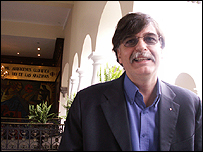By Kintto Luccas. Translated by Machetera for Axis of Logic
 |
|
Kintto Luccas, in Ecuador |
The assertion by Ecuador's president, Rafael Correa, that intelligence services in his country were infiltrated by the United States Central Intelligence Agency (CIA) was a jolt for the Ecuadoran armed forces with yet to be seen consequences.
But, above all, it was evidence that the influence of the Southern Command, begun with the delivery of the Manta Airbase in November, 1999, has had negative consequences inside the armed forces, resulting in an increase among those who seek subordination to the policies of the United States, to the detriment of those who defend a nationalistic policy, once a wide majority.
A highly placed officer in the Ecuadoran armed forces who preferred to remain anonymous, told the IPS news service that this was a crucial moment from which only two paths ex ist: "that of the military returning to its nationalistic policies or finally delivering itself to American (U.S.) demands."
He said that to maintain a nationalistic policy, "It's necessary for independent and progressive sectors to retake control of the institution and restrict the power of a group answering to the ex-president, Lucio Guti�rrez." The process of change within the Ecuadoran armed forces began following the 1995 war with Peru, but deepened after the rebellion of January 21st, 2000, with a schism resulting in the armed forces and the beginning of U.S. influence.
The former head of the U.S. Southern Command, Charles Wilhelm, said in 2000 that through the accord which ceded the military base and port at Manta to U.S. armed forces, one of the objectives of the military officers in Washington was to "reorient" the Ecuadoran armed forces.
Part of this reorientation was the transformation of the Ecuadoran military into one more closely resembling the armies of the Southern Cone, or Colombia, under a doctrine of repression.
To fulfill this objective it was necessary to eliminate progressive elements and modify the social relationship of the military with different social sectors, such as the indigenous, and furthermore it was supposed to deepen the training agreements signed between the U.S. and Ecuadoran armed forces.
The changes in training were supported at the time by the rightwing ex-President Le�n Febres Cordero (1984-1988), accused of having committed serious human rights violations during his presidency and having maintained his political power for decades without being in government.
TWO
In his weekly radio address on Saturday, April 5, Correa denounced the CIA for "having completely infiltrated some of [Ecuador's] military intelligence organizations."
Just days earlier, the Army's intelligence director, Mario Pazmi�o, had been removed, for concealing i nformation, and it was announced that further steps would be taken.
According to the president, the concealment of information caused mistakes in the handling of the country's military and diplomatic affairs in the conflict with Colombia.
Last Tuesday night, April 8, another backlash from the crisis was felt when the resignation of the Defense Minister, Wellington Sandoval was accepted, and his personal secretary, the journalist and writer Javier Ponce was named as the new minister. Sandoval's resignation came two days after the Defense Ministry announced the formation of a high-level Civil Commission, to "determine the degree of unauthorized linkage between Ecuadoran officials and intelligence units" with "centers of foreign intelligence," according to a communique distributed by the military news agency, Notimil. The communique clarified that "the Council of Generals for Ground Forces" met on Thursday, April 3, and decided to put Colonel Mario Pazmi�o "on res erve" for the National Defense Minister, instead of "active duty," and that he had not been "discharged," as some media had reported.
It was also stated that an investigative process would be launched to determine "alleged responsibilities that the officer in question would have had with the delivery of timely and complete information" surrounding the bombing by Colombian armed forces of the FARC (Revolutionary Armed Forces of Colombia) encampment in Ecuador, where the guerrilla leader Ra�l Reyes and 24 other people were killed.
After Sandoval's departure, the head of the Armed Forces Joint Command, H�ctor Camacho, and the Army Commander Guillermo V�sconez, volunteered their availability, which was accepted by the President. Ecuador's new Defense Minister, Javier Ponce, has a difficult task awaiting him in overcoming the crisis faced by his country's armed forces and the long arm of the CIA in the national intelligence services, but more than anything, in the s trengthening of a nationalistic point of view.
Ponce pointed out that "This is not a setup for a witch hunt, but a healthy critical process in the exercise of transparency. The stability of our democracy is not based on concealment, but in the courageous analysis of our acts," he emphasized, after inviting the Armed Forces "to undertake a thorough review of its structures and practices."
THREE
The news portal Ecuadorinmediato, citing military sources, said on Monday, April 7 that "Pazmi�o's fall would be the outcome of a series of complaints and denunciations by senior officers, who the colonel disobeyed," while "he headed the Ecuadoran army's intelligence wing for more than ten years."
According to their information, once information about the alleged knowledge of Ecuador's Armed Forces about the Colombian attack on Ecuadoran territory began to be revealed, certain military officers lodged internal protests, accusing military intelligence of not keeping them informed.
At the same time, certain media distributed a report according to which, the Ecuadoran Franklin Aizalla, killed alongside Ra�l Reyes, had been followed by military intelligence over several years without this information being shared with Rafael Correa.
On March 17, Rafael Correa and his Defense Minister learned through press reports about the tailing of Aisalla, something that Colombia's president had known about for quite some time.
"Mario Pazmi�o Silva's resume denotes very effective training by the security organizations of the United States and Israel," said Ecuadorinmediato.com, adding that the colonel "practically self-directed military intelligence operations without bothering to provide proper reports to his superiors, many of whom were unaware of such actions."
The source consulted by IPS acknowledged that Pazmi�o acquired his power over a period of years, but also protested the negligence of t he colonel's direct commanders over the past ten years.
Furthermore he indicated that Pazmi�o deserved a dishonorable discharge and a trial for treason against the country, and not to be simply put on reserve.
"Maybe there's a fear that Pazmi�o has information about lots of military officers that he could reveal," said the military officer consulted by IPS.
He also explained that "those who've worked in intelligence linked with the CIA generally don't reveal it because it's their most valuable weapon."
Alexis Ponce, of the Permanent Assembly for Human Rights, stressed that "this is the first time that a head of state has touched on the subject," and "it seems to me to be a historic opportunity," to dismantle "officers and groups that are autonomously doing parallel intelligence work that goes against the very interests of Ecuadoran security."
The retired Colonel Jorge Brito, military commander during the 1995 war with Peru and one of the ar my officers who participated in the indigenous military rebellion in January, 2000, prosecuted Pazmi�o in 2001, accusing him of heading the White Legion, an alleged rightwing group which delivered death threats to journalists, the IPS correspondent among them, human rights activists, and political and social leaders.
According to Ponce, Pazmi�o began his intelligence career during the Le�n Febres Cordero government.
About Pazmi�o's possible nexus with the Colombian intelligence services, Ponce recalled that the people living in zones near the bombing testified that the day of the attack, "senior military officers from the Intelligence Brigade in the zone" told them that they were leaving "the area, because there were going to be 'clashes.'"
FOUR
The U.S. Embassy in Ecuador, through its spokesman Arnaldo Arves�, said that his country valued the relationship between Ecuador and the United States, "and we are willing to discuss i ssues involving both countries."
Despite the denunciations from the Ecuadoran president, on Monday the head of the Joint Command, H�ctor Camacho, together with the U.S. Ambassador, Linda Jewell, opened a seminar titled "Challenges and Strategic Opportunities" which is part of the cooperative agreement between the U.S. Southern Command and the Ecuadoran Armed Forces.
Jewell said that the event was an opportunity for the country, given that its information would serve as a basis for defining a national security strategy "tailored for Ecuador."
Coincidentally, a few days earlier on March 31, in Colombia, the Southern Command handed over the No. 6 Air Combat Command at the Tres Esquinas base in Caquet�. Senior officers in the Southern Command and the Colombian Air Force attended the handover at these posts which possess radar and other high technology apparatuses.
The U.S. government has handed over other similar posts in other parts of Colombia. One is the island of San Andr�s, another is the city of Rioacha, in the Department of La Guajira, another the city of San Jos� del Guaviare in Guaviare, and another in the municipality of Marandua in Vichada. That of Tres Esquinas, in Caquet�, was the last in the series of handovers, and therefore a special ceremony was held, according to military representatives, to commemorate the results of the joint work of the two countries in the fight against "drug trafficking and terrorism."
The U.S. commanders celebrating the handover were in Ecuador only days later to conduct their workshop with the Ecuadoran Armed Forces.
The military officer IPS spoke to was opposed to this type of joint training activity which, according to him, conditions the Ecuadoran armed forces.
He also stated that that besides the "CIA infiltration in the armed forces, it's essential to see what happens with the police," and recalled that "it was always the police who had the strongest lin ks with United States security policies for the region."
In January of 2004, following the arrest of the FARC leader Sim�n Trinidad in Quito, the Public Affairs officer for the U.S. Embassy in Ecuador, Marty Estell, said that the operation was "an example of cooperation between the Ecuadoran and Colombian police, a joint operation that turned out perfectly," and that had counted on the support of U.S. secret services.
Days after the March 1 bombing, the magazine Cambio de Colombia reported that members of Ecuador's police intelligence were involved in locating the camp.
Hours after the military source was identified, Rafael Correa accepted the resignation of General Bol�var Cisneros, Commander of Ecuador's Police.
According to the first reports, his departure was due to problems in the reporting of data from police intelligence.
It's necessary to go beyond Cisneros and cause a structural change in information services, as well as review the cooperative agreements to which the police and the armed forces may be subject.
Copyright 2008 by AxisofLogic.com
This material is available for republication as long as reprints include verbatim copy of the article its entirety, respecting its integrity. Reprints must cite the author and Axis of Logic as the original source including a "live link" to the article. Thank you!
Original Source in Spanish: REBELLIÓN, published on 11 April, 2008
The author, Kintto Luccas is a writer and journalist who was born in Uruguay and now lives in Ecuador.

The translator, Machetera is a member of Tlaxcala, the network of translators for linguistic diversity, and editor of Machetera. Visit Tlaxcala, an organization that translates articles written in 11 different languages for readers around the world.

